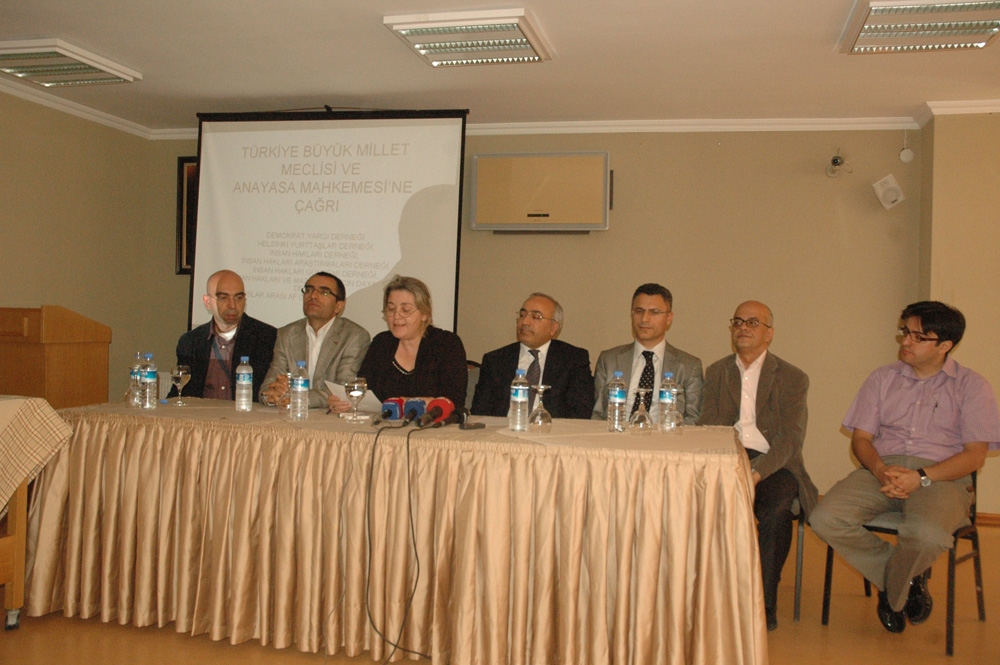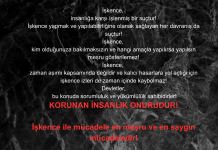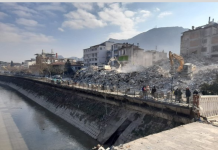İHOP'tan yeni çeviriler: Evrensel Periyodik İnceleme Mekanizmasının Türkiye'yle ilgili raporları
Birleşmiş Milletler İnsan Hakları Konseyinin 5/1 sayılı kararı uyarınca oluşturulan Evrensel Periyodik İnceleme Çalışma Grubu, sekizinci oturumunu 3-14 Mayıs 2010 tarihleri arasında tamamladı. EPİM kapsamında Türkiye’yle ilgili ilk inceleme bu oturumda gerçekleştirildi. İnsan Hakları Konseyinin Türkiye’yle ilgili incelemesinde ele aldığı raporlar ve Çalışma Grubunun Türkiye hakkındaki taslak raporunun sonuç ve öneriler bölümü İHOP tarafından Türkçeye çevrildi.
20 HAZİRAN DÜNYA MÜLTECİLER GÜNÜ ORTAK ETKİNLİK PROGRAMI
VAN – İZMİR – ANKARA – İSTANBUL
18–19–20 Haziran 2010
20 Haziran Dünya Mülteciler Günü Ortak Etkinlik Programını bilgisayarınıza indirmek için tıklayınız.
AN OPEN CALL TO THE GRAND NATIONAL ASSEMBLY OF TURKEY AND THE CONSTITUTIONAL COURT
On 7 May 2010, the Grand National Assembly of Turkey passed a bill on Turkey’s constitutional amendments offering partial relief for the entrenched military influence over civilians that was reinforced by the army-led 1980 coup d’état. Following the Supreme Board of Elections interpretation/decision, these amendments shall be put to a public referendum on 12 September 2010.
Although current amendments are insufficient to ensure full democratization, they still provide an invaluable opportunity to create the ground for moving beyond the coup d’état Constitution, saving the judiciary from the hegemony of elites, and allowing, at least, a partial inclusion of different social segments in the judicial process. They also pave the way for bringing perpetrators of the coup d’état to justice and mark an end to the deep connection between the judiciary and the pro-coup mindset and its backers.
The amendments were also welcomed by the European Union. However, political and bureaucratic interests resistant to change allege that these amendments are in conflict with irrevocable provisions of the Constitution of Republic of Turkey and have taken all measures to maintain the status quo. Furthermore, these groups are seeking to rely on the assistance of the Constitutional Court, which opted to remain silent and obedient, instead of protecting constitutional and democratic values, in the face of the military coup.
In this connection, it should be noted that if a Constitution is incompatible with the principles of democracy and the rule of law, there is a strong implication that the Constitutional Court sides not with democratic interests, but with the coup d’état.
There is a tendency to ignore the fact that in response to constitutional violations in several decisions adopted by the Constitutional Court in the 1970s, the Grand National Assembly of Turkey has forbidden the Constitutional Court from reviewing the substance of constitutional amendments and limited its power to only conduct reviews in respect to the form of amendments. This limit is clearly stipulated in Article 148 of the Constitution of the Republic of Turkey.
Irrespective of any justification, the Constitutional Court is not entitled to carry out judicial review on the substance, and any such act shall be deemed as a grave breach of the Constitution. Furthermore, such attempt will also be tantamount to the hijacking the will of the Parliament and nullifying hopes for democratization through legal means. In this vein, it is obvious that any decision of the Constitutional Court based on a review of the substance shall be legally void.
As the Constitutional Court noted in its own decision, “acting within the framework of ‘judicial authority’ determined by the primary constituent power is a precondition for rendering acts and decisions of the legislative, executive and judiciary branches and their sub-units envisioned by the Constitution as legally valid.”
The Constitutional Court should not cause a political turmoil by adopting an annulment or stay of execution decision and refrain from any interference or curtailment of citizens’ wills as manifested through public referendum.
However, in its decision regarding Articles 10 and 42 of the Constitution, the Constitutional Court attempted to convert the term “requisite majority” to “requisite condition” and based its decision on this reasoning. It should be noted that such approach will neither be effectual in creating legitimate case law nor serve as a precedent for ensuing violations.
Constitution making is political. The Constitutional Court is under the obligation to adopt a positive attitude in favor of freedoms and democracy, comply with the spirit of Article 90 of the Constitution and respect the people’s right to determine its own future. It is important to recall the fact that the locus of resolutions of political issues is not the courts, but free general elections and the will of the nation.
On the other hand, the Grand National Assembly of Turkey should not confine its efforts to Constitutional amendments. The Assembly should consider amendments as components of a democratization process and expeditiously assume appropriate steps in the forthcoming period.
Problems caused by Heavy Criminal Courts with Special Jurisdictions as products of coup d’état traditions and policies of “otherization”, unlawful and unfair arrests and unlawful procedures in trials of children in conflict with the law should be urgently addressed and such practices should be abandoned to contribute to peace and reconciliation.
Furthermore, the deep influence enjoyed by the Supreme Court of Appeals, the Council of State, the Supreme Board of Judges and Prosecutors and the Ministry of Justice over the courts of first instance should be eliminated as a prerequisite and other appropriate and adequate measures should be urgently adapted to abolish the hierarchy within the judiciary.
A new Constitution based on the principles of inclusion, openness and wide social endorsement requires amendments in the Law on Political Parties and Electoral Law. These amendments are also necessary to strengthen the Parliament and its will and pave the way for a stronger and consistent position against bureaucratic control. The election threshold, which only allows representation of certain majority parties, effectively deprives millions of citizens the right of representation, and should be lowered to a reasonable level. In addition, other appropriate measures should be enacted in order to establish intra-party democracy in political parties.
We should never forget that Turkey still needs a new constitution.
It is time for representatives of the people to take all necessary democratic steps to ensure that the sovereignty of the nation rests with the people and this principle is reflected at all levels of the state.
The Constitutional Court and political actors should refrain from wasting this opportunity.
Union of Judges and Prosecutors for Democracy and Liberty
Helsinki Citizens’ Assembly
Human Rights Association
Human Rights Research Association
Association of Human Rights and Solidarity for Oppressed People
Amnesty International Turkey
Representatives: Osman Can, Öztürk Türkdoğan, Ertuğrul Cenk Gürcan, Hakan Ataman, Emrullah Beytar, Levent Korkut, Feray Salman
TÜRKİYE BÜYÜK MİLLET MECLİSİ ve ANAYASA MAHKEMESİNE ÇAĞRI

1980 askeri darbesinin yarattığı vesayet sisteminde kısmi bir demokratikleşme imkânı yaratan Anayasa değişiklikleri 7 Mayıs 2010 tarihi itibariyle TBMM’de kabul edildi ve Yüksek Seçim Kurulunun yorum/kararıyla da, 12 Eylül 2010 günü yapılması öngörülen referandumla halkın onayına sunulması öngörüldü.
Yapılan değişiklikler, her ne kadar demokratikleşme açısından yetersiz de olsa, hiç değilse bir darbe anayasasından uzaklaşma imkânına zemin hazırlamakta; yargı kurumları, bir seçkinler egemenliğinden kurtarılmakta, kısmen de olsa farklı toplumsal renklerin yargıya yansıtılması imkânı yaratılmaktadır. Darbecilere karşı yargı yolu açılmakta, yargının da darbeyle ve darbecilerle kader ortaklığına son verilmektedir.







 Tunus Cd. 87/8 Kavaklıdere Ankara 06680 Türkiye Tel: +90 312 468 84 60 E-Posta:ihop@ihop.org.tr.
Tunus Cd. 87/8 Kavaklıdere Ankara 06680 Türkiye Tel: +90 312 468 84 60 E-Posta:ihop@ihop.org.tr.